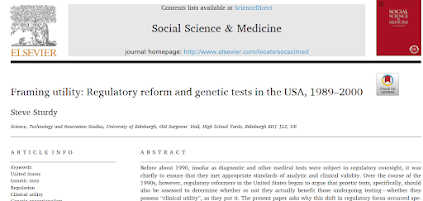While I hope I'm not grumpy, I'm old enough (65) to be annoyed by long-established things being referred to as new. At a conference today someone will say, "Until 5 years ago, coverage did not require clinical utility," or "Until 10 years ago, no one ever asked about clinical utility of a test."
This is nonsensical, and could probably be refuted with quotes from William Osler (d. 1919). But I certainly remember when I was a med student in the mid-1980s it was routine for residents and med students to be grilled about "How will that diagnostic test improve the patient's outcome?"
Here's a paper I ran across, from 2022, but it's a medical history study of the period 1989-2000. It's called, "Framing utility: Regulatory reform and genetic tests in the USA" (Steve Sturdy, Edinbough, here).
He writes, "Over the decade of the 1990s, however, regulatory reformers in the United States began to argue that genetic tests, specifically, should also be assessed to determine whether or not they actually benefit those undergoing testing—whether they possess 'clinical utility'...[tests should only be introduced] if they had been shown to be beneficial to those tested."
##
As I wrote about in 2016 here, I've read histories of the approval of PSA in 1986 (diagnostic) and 1994 (screening) and they were quite stormy over the patient benefit (clinical utility) that would result. One source was a NYT article from 30 years ago, 1993, here.
